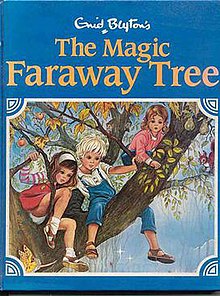Literary nostalgia: how books shape childhoods

Carys Williams takes us on a bookish trip down memory lane. From Enid Blyton to Jacqueline Wilson, the stories we encounter at a young age inevitably have a lasting impact on us.
So much of our childhood is shaped by the books we read and the imaginary worlds we spend our time in. Whether it was the corkscrew-haired, wildly imaginative Tracy Beaker who captured your attention, The Famous Five who took you on all their adventures or the girls at St Clare’s who made you obsessed with the idea of boarding schools and midnight feasts, the potency of literature and imagination in childhood remains all-encompassing.

One series that many people may remember reading as a child is The Magic Faraway Tree by Enid Blyton. Blyton’s incredible aptitude for writing meant that she was able to cater to a child’s whims and imagination. The idea of a magical tree within an enchanted wood that could be climbed to enter a new world every day – such as ‘the Land of Topsy-Turvy’ – was delightful and inspired the minds of many. I along with others have memories of racing through country parks, excitement in the air as we looked for what could be the ‘Magic Faraway Tree’, and convinced ourselves that there were fairies and goblins all around us. Everything seemed possible. As a child, there is nothing greater than coming across an adult who appears to endorse the concept of magic and fantasy existing within the real world. In recent years however, some of Blyton’s writing has been criticised and she has, as a result, lost some of her popularity.

Another famous novel that has helped many children make sense of the real world and the adults around them is Matilda by Roald Dahl. The characters are realistic: everybody knows a Mr and Mrs Wormwood or a bully like Miss Trunchbull. What I liked most about the story as a child was that it celebrated being a bookworm and introverted. In a society that often misunderstands what it means to be an introvert, it was refreshing to read a story that highlights, through the Wormwoods, that speaking loudly doesn’t mean being sensible. Matilda remains popular and Quentin Blake’s illustrations are loved all over the world. The film adaptation with Mara Wilson also featured in many people’s childhoods, Miss Trunchbull and the newt being a prominent memory!

When discussing favourite books with friends, one name in particular always comes up in conversation. Jacqueline Wilson has written many stories and has inspired generations of readers. Memories of Tracy Beaker’s resilience in the face of her testing circumstances, her daydreams about her mother’s pink Rolls Royce and her signature “bog off!” have stayed with fans who grew up devouring Wilson’s books. Blissful to me were the rare days when I was ill and couldn’t go to primary school so could happily spend an afternoon perusing a stack of her latest novels instead! Wilson has also written books set in the more distant past such as Hetty Feather, where the story follows the main character’s life in the 1800s. Part of Wilson’s appeal is perhaps how well she is able to build a bridge between the character and the reader. As a child, you feel as if the character is a real person sitting next to you and that can be a powerful experience.
In short, the books we read during childhood shapes us our literary preferences and understanding of the world. After gravitating towards children’s books that are set in the past, I find myself doing the same as an adult. What books did you love as a child? Do you still enjoy the same genres of literature now?


